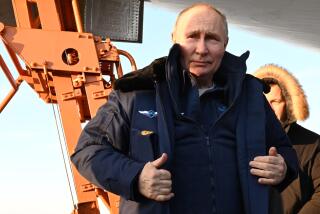A Frail Yeltsin Mourns in Minutes
- Share via
MOSCOW — Ignoring his doctors’ advice not to travel, a frail President Boris N. Yeltsin flew to Jordan on Monday to pay his respects to King Hussein--and to remind the world that Russia’s leader still has a place in international affairs.
Arriving at the king’s palace in Amman, Yeltsin, 68, walked slowly up the steps with the help of an aide. Appearing somewhat disoriented, he waved to people in the crowd outside, then spent about 15 minutes in the palace before departing.
He was in the air and on his way back to Moscow before the king’s funeral was over--yet managed to portray himself as a gutsy leader who will go to great lengths to fulfill his obligations as president.
“He wouldn’t want to miss such an opportunity to demonstrate to the world that he is still president and can make his own decisions regardless of what his aides or doctors might say,” said Sergei A. Markov, director of the Institute of Political Studies in Moscow. “It is all about power. Yeltsin loves power far more than his own health.”
Appearing on the world stage in Amman--even briefly--was in keeping with the current style of Yeltsin’s presidency. The two-term leader, whose behavior has long been unpredictable, has become even more erratic in recent months as his health has deteriorated.
Compelled by illness in October to turn over day-to-day management of the government to Prime Minister Yevgeny M. Primakov, the president has increasingly tried to assert his authority with an occasional dramatic act, such as showing up at the Kremlin last week and firing four aides.
Few Russians, however, expect Yeltsin to regain either his physical or his political strength. The once-hearty pro-democracy leader who helped bring down the Soviet Union has turned into a tired old man who appears to have little influence over Russia as it slides deeper and deeper into corruption and poverty.
Since his reelection in 1996, Yeltsin’s presidency has been marked by open heart surgery, two rounds of pneumonia, nervous exhaustion and a bleeding ulcer. His visit to his Kremlin office last week was the first since New Year’s Day. Most of the year, he has been in the hospital receiving treatment for his ulcer or recuperating at a sanitarium outside Moscow--where he went directly from the airport on his return from Amman.
Yeltsin’s visit to Jordan was his first trip abroad since October, when he stumbled and appeared disoriented during an excursion to Central Asia. Two weeks later, the Kremlin abruptly canceled a trip to Vienna and said Yeltsin was suffering from a vague “neuro-psychological” condition that could range from depression to dementia.
The one-day trip to Amman was scripted to put the minimum amount of strain on the president. There was no requirement that he speak in public and no opportunity for reporters to ask embarrassing questions.
Yeltsin did not walk past Hussein’s coffin to pay his respects along with hundreds of other dignitaries and heads of state from around the world. Nor did he join them in walking to the cemetery where Hussein was buried.
According to a Kremlin spokesman, Yeltsin met briefly with Jordan’s new king, Abdullah II, who left his post near the casket and greeted the Russian president in another room. The Kremlin sought to put the best spin on the visit, saying Yeltsin had met with several foreign leaders, including President Clinton.
Russian Foreign Minister Igor S. Ivanov, who accompanied Yeltsin, denied anonymous Jordanian reports that Yeltsin received medical attention inside the palace. “All this time the president of Russia was engaged in most active work,” he said. “Medical aid was not required for a single moment.”
Nevertheless, Communist leader Gennady A. Zyuganov, who never misses an opportunity to criticize Yeltsin, called the president’s visit to Jordan a “tragic comedy.”
“He went to bow to the king who had done so much for the cause of peace in the Middle East,” Zyuganov said in a television interview. “But he was not even able to come to the casket and take part in the ceremony.”
Some suggested that in honoring a leader credited with helping to bring peace to the Middle East, Yeltsin might have had in mind his own legacy as much as Hussein’s.
“Yeltsin realizes he himself is standing on the threshold of his own funeral,” Markov said, “and he wants to send the message to all the world leaders that he would expect them all to remember how he behaved in similar circumstances and to come to his funeral--no matter what.”
More to Read
Sign up for Essential California
The most important California stories and recommendations in your inbox every morning.
You may occasionally receive promotional content from the Los Angeles Times.













